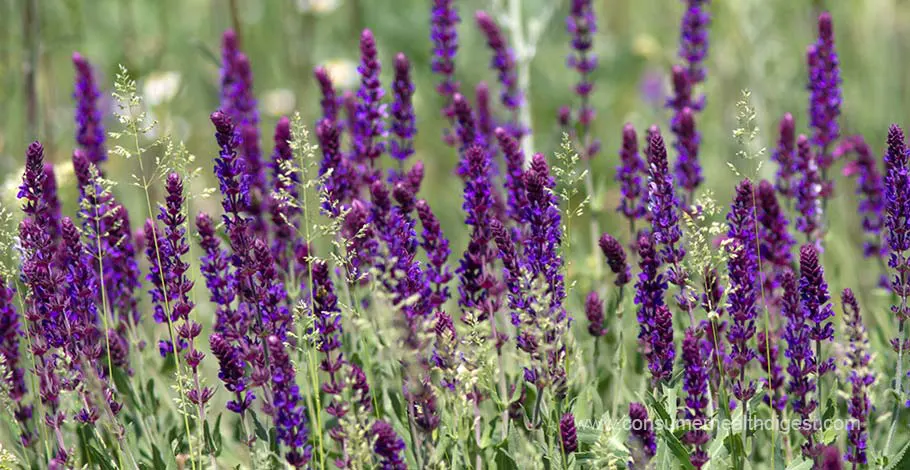In This Article
What is Sage?
The sage plant (Salvia officinalis) is usually seen in spice racks. It belongs to the mint family, and because of its intense flavor, it is only used in limited doses. Sage usually is dried and used to flavor entrees and side dishes, but it also has medicinal benefits that people in both Eastern and Western cultures have used for millennia. [1]

Scientists have been studying the effectiveness of sage or sage extracts in preventing and treating medical conditions in recent years.
Oregano, thyme, basil, and rosemary are also members of this family
What is Sage Used for?
Sage is now used in various areas, including the culinary industry, as a spice and in producing cosmetics. Sage can alleviate the symptoms of Asthmatic patients when they inhale it. [2]
Flatulence, bloating, heartburn, diarrhea, bloating, and loss of appetite, among other digestive issues, are treated with this medicinal and therapeutic herb. Sage has also been used to treat memory loss, depression, and Alzheimer’s disease for several years.
It also helps with menopausal symptoms such as painful periods and hot flashes. When applied to the skin, it can help with gum disease, cold sores, sore mouth, and various nasal difficulties.
Where Does It Come From?
The leaves of a perennial, evergreen herb native to the Mediterranean region are used to make sage. Grayish leaves, blue to purplish flowers, and a woody stem make up this herb.
Due to its medicinal and culinary uses, this herb has been cultivated in several parts of the world. Sage is being used as a decorative garden plant in many countries worldwide, including the United States. [3]

The Benefits of Sage
What Are the Benefits of Sage?
Sage is beneficial to your health because of its culinary purposes as well as its evident therapeutic properties. With that in mind, let’s take a closer look at sage’s health benefits.
1. Treats Alzheimer’s Disease
Sage can benefit your brain and memory in a variety of ways.
According to a review of studies, two different species of sage can improve cognitive skills and protect against neurological illnesses. [4]
Sage has also been shown in studies to help patients with Alzheimer’s disease enhance their memory, brain function, and information processing. [5]
2. Boosts mental performance
Sage has been found in studies to help individuals improve their concentration, memory, and overall mental performance. The aroma of sage is said to boost alertness but has little effect on attention or memory.
3. Loaded With Antioxidants
Antioxidants aid in the fight against free radical molecules in our environment, which can harm our cells and lead to cancer. In tiny amounts, sage includes antioxidant vitamins A, C, and E.
Sage is also high in polyphenols, which are plant-based chemical components that work as antioxidants in the body. [6]
4. May Protect Against Certain Cancers
Cancer is a disease in which cells develop improperly and cause death.
Surprisingly, animal and test-tube research show that sage can help fight cancers of the liver, mouth, colon, skin, cervix, breast, and kidney. [7]
In these researches, sage extracts not only prevent cancer cell growth but also promote cell death.
While this research is promising, more research is needed to see if sage can effectively combat cancer in humans.
5. Lowers Cholesterol
Sage reduces the levels of “bad” cholesterol and fat in the blood in obese or overweight adults when taken three times a day for two months.
6. Ease Menopausal Symptoms
Continuous usage of Sage extracts has been demonstrated to reduce menopausal symptoms, including hot flashes. [8]
According to new research, when coupled with Alfalfa extracts, Sage appears to help with hot flashes and night sweats. [9]
Side Effects of Sage
When used in fewer amounts, sage is said to be safe. It’s also safe to take by mouth or apply to the skin directly. On the other hand, Sage can be harmful in high amounts over a lengthy period of time. [10]
It also contains thujone, a toxic substance that can bring out seizures, liver damage, and nervous system changes. Thujone has been linked to a decrease in milk production in nursing mothers. [11]
If you use Sage and have diabetes, keep an eye on your sugar levels because it can drop blood sugar in people with diabetes.
Sage may have similar effects on people with hormone-sensitive illnesses such as uterine fibroids, breast cancer, and ovarian cancer. High blood pressure and convulsions are two possible Sage adverse effects.
Recommended Doses and Timing for Sage
The amount of Sage to take and when to take it depends on the ailment being treated.
One mg of Sage per day is the scientifically advised dosage for Alzheimer’s disease treatment. Over time, the dosage can be raised to 2.5 milligrams three times each day.
Apply 23 mg of sage topically to the afflicted areas every 2 to 4 hours during the day for 10 to 14 days to treat cold sores.
When dealing with various health conditions, remember to verify the manufacturer’s guidelines for use because dosing and timing may differ.
Also, speak with your doctor for more specific advice.
Uses of Sage in Supplements
Sage is offered as a dietary supplement. It’s in various products used to treat mental health issues like depression, loss of appetite, poor attention, memory loss, obesity, ADHD, and Alzheimer’s disease.
While sage can help with various ailments, it should not be taken in place of prescription medications. It can be taken as a dietary supplement to help prevent various ailments from occurring.
Sage Interactions
If you already use diabetes medication, avoid using Sage because it might cause dangerously low blood sugar levels.
It should also not be used with anticonvulsants, a type of seizure medication, or sedatives.
Frequently Asked Questions
Q: What is Sage Good for?
A: Almost any savory recipe will benefit from the addition of this green spice. It can be eaten fresh, dried, or used to make tea.
Loss of appetite, gas, stomach pain, bloating, diarrhea, and heartburn are digestive problems that can be solved with sage use. It’s also used to treat depression, memory loss, and Alzheimer’s disease, as well as to reduce excessive sweating and saliva production. [12]
Q: Where to Buy Sage?
A: You can buy dried and fresh sage at grocery stores. Sage capsules, powders, extracts, essential oils, teas, and homeopathic remedies can be gotten online or at retail drugstores and health food outlets.
Q: What Does Burning Sage Do
A: When sage is burned, it is linked to
- Purifying
- Relieving the symptoms of some conditions
- Improving mood
- Soothe stress
- Improving the quality of sleep
- Boost cognition
- Boost energy levels
- Create an uplifting fragrance
Q: Can I Consume Sage?
A: Sage is a herb that can be consumed whole or crushed. Without adding extra calories or salt, sage can enhance the flavor of a dish.
Q: What Does Sage Taste Like?
A: Sage is an earthy, somewhat peppery herbal flavor with hints of lemon, mint, and eucalyptus.
Conclusion
Sage looks to be one of the most important compounds to look for in any sage supplement because it is a naturally extracted ingredient with a long list of health advantages.
Although additional research is needed, it is thought that Sage may be helpful in the treatment of a variety of different ailments.
12 Sources
We review published medical research in respected scientific journals to arrive at our conclusions about a product or health topic. This ensures the highest standard of scientific accuracy.
[1] Ghorbani A, Esmaeilizadeh M. Pharmacological properties of Salvia officinalis and its components. J Tradit Complement Med. 2017;7(4):433-440. Published 2017 Jan 13. doi:10.1016/j.jtcme.2016.12.014[2] Abu-Darwish MS, Cabral C, Ferreira IV, et al. Essential oil of common sage (Salvia officinalis L.) from Jordan: assessment of safety in mammalian cells and its antifungal and anti-inflammatory potential. Biomed Res Int. 2013;2013:538940. doi:10.1155/2013/538940
[3] Jiang TA. Health Benefits of Culinary Herbs and Spices. J AOAC Int. 2019 Mar 1;102(2):395-411. doi: 10.5740/jaoacint.18-0418. Epub 2019 Jan 16. PMID: 30651162.
[4] Lopresti AL. Salvia (Sage): A Review of its Potential Cognitive-Enhancing and Protective Effects. Drugs R D. 2017;17(1):53-64. doi:10.1007/s40268-016-0157-5
[5] Lopresti, A.L. Salvia (Sage): A Review of its Potential Cognitive-Enhancing and Protective Effects. Drugs R D 17, 53–64 (2017). https://doi.org/10.1007/s40268-016-0157-5
[6] Lu Y, Foo LY. Polyphenolics of Salvia--a review. Phytochemistry. 2002 Jan;59(2):117-40. doi: 10.1016/s0031-9422(01)00415-0. PMID: 11809447.
[7] Jiang Y, Zhang L, Rupasinghe HP. Antiproliferative effects of extracts from Salvia officinalis L. and Saliva miltiorrhiza Bunge on hepatocellular carcinoma cells. Biomed Pharmacother. 2017 Jan;85:57-67. doi: 10.1016/j.biopha.2016.11.113. Epub 2016 Dec 5. PMID: 27930987.
[8] Bommer S, Klein P, Suter A. First time proof of sage's tolerability and efficacy in menopausal women with hot flushes. Adv Ther. 2011 Jun;28(6):490-500. doi: 10.1007/s12325-011-0027-z. Epub 2011 May 16. PMID: 21630133.
[9] Rahte S, Evans R, Eugster PJ, Marcourt L, Wolfender JL, Kortenkamp A, Tasdemir D. Salvia officinalis for hot flushes: towards determination of mechanism of activity and active principles. Planta Med. 2013 Jun;79(9):753-60. doi: 10.1055/s-0032-1328552. Epub 2013 May 13. PMID: 23670626.
[10] Hamidpour M, Hamidpour R, Hamidpour S, Shahlari M. Chemistry, Pharmacology, and Medicinal Property of Sage (Salvia) to Prevent and Cure Illnesses such as Obesity, Diabetes, Depression, Dementia, Lupus, Autism, Heart Disease, and Cancer. J Tradit Complement Med. 2014 Apr;4(2):82-8. doi: 10.4103/2225-4110.130373. PMID: 24860730; PMCID: PMC4003706.
[11] Pelkonen O, Abass K, Wiesner J. Thujone and thujone-containing herbal medicinal and botanical products: toxicological assessment. Regul Toxicol Pharmacol. 2013 Feb;65(1):100-7. doi: 10.1016/j.yrtph.2012.11.002. Epub 2012 Nov 28. PMID: 23201408.
[12] Hamidpour M, Hamidpour R, Hamidpour S, Shahlari M. Chemistry, Pharmacology, and Medicinal Property of Sage (Salvia) to Prevent and Cure Illnesses such as Obesity, Diabetes, Depression, Dementia, Lupus, Autism, Heart Disease, and Cancer. J Tradit Complement Med. 2014;4(2):82-88. doi:10.4103/2225-4110.130373








 This article changed my life!
This article changed my life! This article was informative.
This article was informative. I have a medical question.
I have a medical question.
 This article contains incorrect information.
This article contains incorrect information. This article doesn’t have the information I’m looking for.
This article doesn’t have the information I’m looking for.